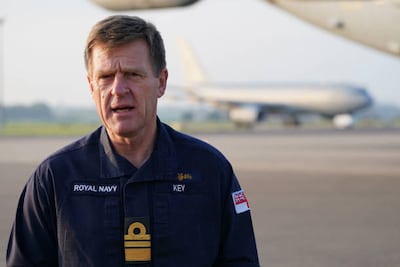Rapid advances in artificial intelligence are forcing militaries to “reimagine warfare”, the head of Britain’s navy said on Wednesday.
Admiral Sir Ben Key also told the Seapower conference in London that the Royal Navy had developed a “quantum accelerometer” that would allow ships to navigate without satellite GPS guidance.
He argued that if the fleet wanted to remain credible as an advanced naval force it had to experiment, taking risks to find the right technology.
This included working in the digital arena where the “pace of change is rapid at times, particularly in AI – it is breathtaking”, he told the audience of admirals and academics.
“Everyone, friend and potential adversary alike, is stepping into this space. It is causing us to reimagine warfare, creating dynamic new benchmarks for accuracy, efficiency and reality.”
The navy was being “deliberately ambitious” to survive the potential “advanced lethality” of weapons possibly created by AI, he said.

Part of the rapid technology development was being conducted on the navy’s XV Patrick Blackett, an experimental ship trialling sea drones and new ideas to rapidly introduce them into service.
“For instance, in partnership with Imperial College, she is currently testing a quantum accelerometer, a means by which we can safely navigate in a satellite denied environment, ensuring we can continue to operate even if others cannot,” said the First Sea Lord.
For several years scientists have been working on quantum accelerometers – that can measure the wavelike properties of matter – to replace GPS navigation.
Admiral Key also announced that Britain’s warships would operate a mix of “crewed and uncrewed aircraft”, including unmanned helicopters and jets.
He added that Britain’s shipbuilding industry was in a healthy state with 16 warships and six nuclear powered submarines under construction, representing a “major capital programme”.
Despite the AI and technological advances, the admiral insisted that in warfare it was “well-trained and well-led people” that would be “the decisive factor in 21st century competition”.


